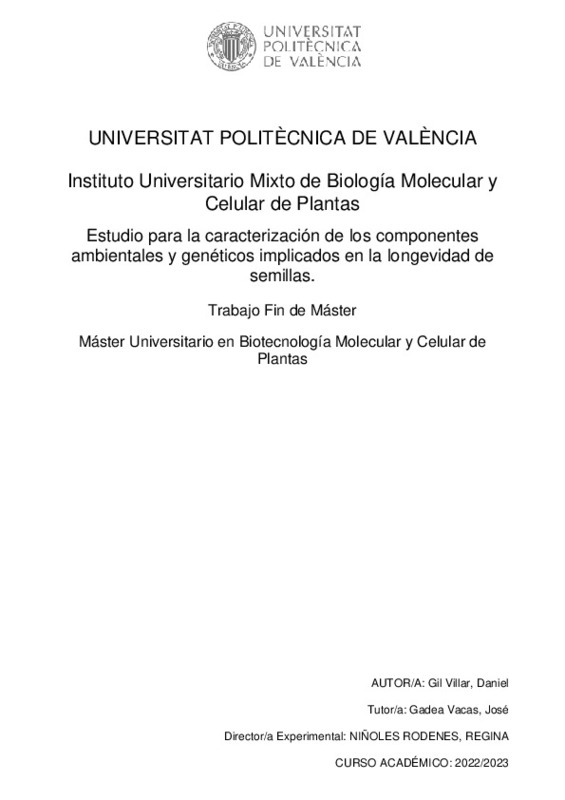|
Resumen:
|
[ES] Las semillas constituyen el principal modo de propagación de las plantas y suponen, por sí mismas, una esencial fuente de alimento, por lo que el estudio de factores que determinen su calidad tiene no sólo importancia ...[+]
[ES] Las semillas constituyen el principal modo de propagación de las plantas y suponen, por sí mismas, una esencial fuente de alimento, por lo que el estudio de factores que determinen su calidad tiene no sólo importancia para el mantenimiento de la biodiversidad sino también interés agronómico. Por ejemplo, las semillas van perdiendo gradualmente viabilidad durante el almacenamiento y las empresas productoras de semillas demandan mecanismos para retrasar ese "envejecimiento", que depende tanto de factores ambientales como genéticos. Lo mismo ocurre con otros aspectos de calidad de la semilla, como su tamaño o velocidad germinativa.
En este laboratorio hemos investigado en los últimos años algunos factores genéticos que determinan la calidad de la semilla y trabajos anteriores del grupo han identificado varios mutantes de Arabidopsis que presentan una longevidad alterada. Entre otros, el mutante tt7 tiene afectado un enzima de biosíntesis de flavonoides y presenta una sensibilidad extrema al envejecimiento. Por otra parte, se conoce que las condiciones de crecimiento de la planta madre influyen en el comportamiento posterior de su descendencia, por ejemplo, mediante mecanismos epigenéticos. Por lo tanto, es muy relevante esclarecer cómo factores ambientales como la luz o la temperatura de crecimiento del parental pueden llegar a condicionar la calidad de sus semillas, incluyendo aspectos como longevidad, tamaño, vigor o velocidad de germinación.
En este TFM se estudia cuál es la influencia del ambiente en el que vive la planta madre (luz y temperatura) sobre la calidad de sus semillas. Asimismo, se profundiza en los componentes moleculares que provocan la sensibilidad a envejecimiento acelerado del mutante tt7. Por lo tanto, este trabajo investiga los factores ambientales y genéticos que determinan la calidad de las semillas, con el fin último de ofrecer semillas más vigorosas y capaces de mantenerse viables por más tiempo.
[-]
[EN] Seeds are the main mode of propagation of plants and are, by themselves, an essential source of food, so the study of factors that determine their quality is not only important for the maintenance of biodiversity but ...[+]
[EN] Seeds are the main mode of propagation of plants and are, by themselves, an essential source of food, so the study of factors that determine their quality is not only important for the maintenance of biodiversity but also of agronomic interest. For example, seeds gradually lose viability during storage and seed companies demand mechanisms to delay this "aging", which depends on both environmental and genetic factors. The same happens with other aspects of seed quality, such as its size or germination speed.
In this laboratory we have investigated in recent years some genetic factors that determine seed quality and previous work by the group has identified several Arabidopsis mutants that have altered longevity. Among others, the tt7 mutant has an affected flavonoid biosynthesis enzyme and is extremely sensitive to ageing. On the other hand, it is known that the growth conditions of the mother plant influence the subsequent behavior of its offspring, for example, through epigenetic mechanisms. Therefore, it is very relevant to clarify how environmental factors such as light or the parental growth temperature can condition the quality of its seeds, including aspects such as longevity, size, vigor or germination speed.
In this TFM we study the influence of the environment in which the mother plant lives (light and temperature) on the quality of its seeds. Likewise, it delves into the molecular components that cause the sensitivity to accelerated aging of the tt7 mutant. Therefore, this work investigates the environmental and genetic factors that determine the quality of the seeds, with the ultimate goal of offering more vigorous seeds capable of staying viable for longer
[-]
|







